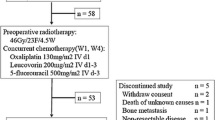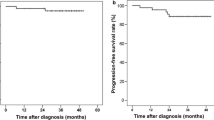Abstract
Purpose
A multicenter phase II clinical study was performed in patients with T3 or T4 stage II/III rectal cancer to evaluate the efficacy and safety of neoadjuvant chemotherapy with 5-fluorouracil, levofolinate, and oxaliplatin (mFOLFOX6).
Methods
Patients received four 2-week cycles of mFOLFOX6 therapy (oxaliplatin at 85 mg/m2 + leucovorin at 200 mg/m2 + fluorouracil as a 400 mg/m2 bolus followed by infusion of 2400 mg/m2 over 46 h, all on Day 1). They were evaluated by computed tomography after completion of the fourth cycle. If there was no disease progression, two additional cycles were administered and then surgery was performed. Adjuvant chemotherapy was generally administered for 6 months using appropriate regimens at the discretion of the physician.
Results
mFOLFOX6 therapy was given to 52 patients with locally advanced rectal cancer. The preoperative response rate was 48.8% and the operation rate was 80.8%. Serious adverse events of Grade 3–4 were neutropenia (n = 5), leukopenia (n = 1), thrombocytopenia (n = 1), febrile neutropenia (n = 1), nausea (n = 1), vomiting (n = 1), and peripheral neuropathy (n = 2). The R0 resection rate, pathologic complete response rate, and sphincter preservation rate were 91.0, 11.9, and 73.8%, respectively. Postoperative complications were tolerable.
Conclusions
The present results suggested that neoadjuvant therapy with mFOLFOX6 is safe and effective, representing a reasonable treatment option for locally advanced rectal cancer.

Similar content being viewed by others
References
Cancer Registry and Statistics. Cancer Information Service, National Cancer Center, Japan
Folprecht G, Gruenberger T, Bechstein WO et al (2010) Tumour response and secondary resectability of colorectal liver metastases following neoadjuvant chemotherapy with cetuximab: the CELIM randomised phase 2 trial. Lancet Oncol 11:38–47
Takahashi T, Shibata Y, Tojima Y et al (2013) Multicenter phase II study of modified FOLFOX6 as neoadjuvant chemotherapy for patients with unresectable liver-only metastases from colorectal cancer in Japan: ROOF study. Int J Clin Oncol 18:335–342
Hasegawa J, Nishimura J, Mizushima T et al (2014) Neoadjuvant capecitabine and oxaliplatin (XELOX) combined with bevacizumab for high-risk localized rectal cancer. Cancer Chemother Pharmacol 73:1079–1087
Uehara K, Hiramatsu K, Maeda A et al (2013) Neoadjuvant oxaliplatin and capecitabine and bevacizumab without radiotherapy for poor-risk rectal cancer: N-SOG 03 Phase II trial. Jpn J Clin Oncol 43:964–971
Compton CC (2006) Key issues in reporting common cancer specimens: problems in pathologic staging of colon cancer. Arch Pathol Lab Med 130:318–324
Sauer R, Becker H, Hohenberger W et al (2004) Preoperative versus postoperative chemoradiotherapy for rectal cancer. N Eng J Med 351:1731–1740
Sauer R, Liersch T, Merkel S et al (2012) Preoperative versus postoperative chemoradiotherapy for rectal cancer: results of the German CAO/ARO/AIO-94 randomized phase III trial after a median follow-up of 11 years. J Clin Oncol 30:1926–1933
Bujko K, Nowacki MP, Nasierowska-Guttmejer A, Michalski W, Bebenek M, Kryj M (2006) Long-term results of a randomized trial comparing preoperative short-course radiotherapy with preoperative conventionally fractionated chemoradiation for rectal cancer. Br J Surg 93:1215–1223
Latkauskas T, Pauzas H, Gineikiene I et al (2012) Initial results of randomized controlled trial comparing clinical and pathological downstaging of rectal cancer after preoperative short-course radiotherapy or long-term chemoradiotherapy, both with delayed surgery. Colorectal Dis 14:294–298
Gérard JP, Conroy T, Bonnetain F et al (2006) Preoperative radiotherapy with or without concurrent fluorouracil and leucovorin in T3-4 rectal cancers: results of FFCD 9203. J Clin Oncol 24:4620–4625
Bosset JF, Collette L, Calais G et al (2006) Chemotherapy with preoperative radiotherapy in rectal cancer. N Eng J Med 355:1114–1123
Swedish Rectal Cancer Trial (1997) Improved survival with preoperative radiotherapy in resectable rectal cancer. N Eng J Med 336:980–987
Kapiteijn E, Marijnen CA, Nagtegaal ID et al (2001) Preoperative radiotherapy combined with total mesorectal excision for resectable rectal cancer. N Eng J Med 345:638–646
van Gijn W, Marijnen CA, Nagtegaal ID et al (2011) Preoperative radiotherapy combined with total mesorectal excision for resectable rectal cancer: 12-year follow-up of the multicentre, randomized controlled TME trial. Lancet Oncol 12:575–582
Chau I, Brown G, Cunningham D et al (2006) Neoadjuvant capecitabine and oxaliplatin followed by synchronous chemoradiation and total mesorectal excision in magnetic resonance imaging-defined poor-risk rectal cancer. J Clin Oncol 24:668–674
Fernández-Martos C, Pericay C, Aparicio J et al (2010) Phase II, randomized study of concomitant chemoradiotherapy followed by surgery and adjuvant capecitabine plus oxaliplatin (CAPOX) compared with induction CAPOX followed by concomitant chemoradiotherapy and surgery in magnetic resonance imaging-defined, locally advanced rectal cancer: Group cancer de recto 3 study. J Clin Oncol 28:859–865
Gunderson LL, Sargent DJ, Tepper JE et al (2004) Impact of T and N stage and treatment on survival and relapse in adjuvant rectal cancer: a pooled analysis. J Clin Oncol 22:1785–1796
Schrag D, Weiser MR, Goodman KA et al (2014) Neoadjuvant chemotherapy without routine use of radiation therapy for patients with locally advanced rectal cancer: a pilot trial. J Clin Oncol 32:513–518
Sclafani F, Cunningham D (2014) Neoadjuvant chemotherapy without radiotherapy for locally advanced rectal cancer. Future Oncol 10:2243–2257
Neoadjuvant FOLFOX6 chemotherapy with or without radiation in rectal cancer (FOWARC). https://clinicaltrials.gov/ct2/show/NCT01211210 (2010). Accessed 16 Jun 2015
Harrison M, Beare S, Bridgewater, JA et al (2014) Bevacizumab and combination chemotherapy in rectal cancer until surgery (BACCHUS): a phase II, multicenter, open-label, randomized study of neoadjuvant chemotherapy alone without radiation in patients with MRI-defined high-risk cancer of the rectum not threatening the circumferential margin. J Clin Oncol 32:5s (suppl; abstr TPS3653)
Alberts SR, Horvath WL, Sternfeld WC et al (2005) Oxaliplatin, fluorouracil, and leucovorin for patients with unresectable liver-only metastases from colorectal cancer: a North Central Cancer Treatment Group phase II study. J Clin Oncol 23:9243–9249
André T, Boni C, Navarro M et al (2009) Improved overall survival with oxaliplatin, fluorouracil, and leucovorin as adjuvant treatment in stage II or III colon cancer in the MOSAIC trial. J Clin Oncol 27:3109–3116
Kotaka M, Yoshino T, Oba K, et al (2015) Initial safety report on the tolerability of modified FOLFOX6 as adjuvant therapy in patients with curatively resected stage II or III colon cancer (JFMC41-1001-C2: JOIN trial). Cancer Chemother Pharmacol [Epub ahead of print]
Tournigand C, André T, Achille E et al (2004) FOLFIRI followed by FOLFOX6 or the reverse sequence in advanced colorectal cancer: a randomized GERCOR study. J Clin Oncol 51:229–237
Valentini V, Coco C, Picciocchi A et al (2002) Does downstaging predict improved outcome after preoperative chemoradiation for extraperitoneal locally advanced rectal cancer? A long-term analysis of 165 patients. Int J Radiat Oncol Biol Phys 53:664–674
Janjan NA, Abbruzzese J, Pazdur R et al (1999) Prognostic implications of response to preoperative infusional chemoradiation in locally advanced rectal cancer. Radiother Oncol 51:153–160
Kuo LJ, Liu MC, Jian JJ et al (2007) Is final TNM staging a predictor for survival in locally advanced rectal cancer after preoperative chemoradiation therapy? Ann Surg Oncol 14:2766–2772
Kamiya T, Uehara K, Nakayama G et al (2016) Early results of multicenter phase II trial of perioperative oxaliplatin and capecitabine without radiotherapy for high-risk rectal cancer: CORONA I study. Eur J Surg Oncol 42:829–835
Glasgow SC, Yu J, Carvalho LP et al (2005) Unfavourable expression of pharmacologic markers in mucinous colorectal cancer. Br J Cancer 92:259–264
Sinicrope FA, Foster NR, Thibodeau SN et al (2011) DNA mismatch repair status and colon cancer recurrence and survival in clinical trials of 5-fluorouracil-based adjuvant therapy. J Natl Cancer Inst 103:863–875
Ribic CM, Sargent DJ, Moore MJ et al (2003) Tumor microsatellite-instability status as a predictor of benefit from fluorouracil-based adjuvant chemotherapy for colon cancer. N Eng J Med 349:247–257
Author information
Authors and Affiliations
Corresponding author
Ethics declarations
Conflict of interest
The authors had no commercial interest in the study subject. No financial or material support was received in conjunction with this work.
Rights and permissions
About this article
Cite this article
Koike, J., Funahashi, K., Yoshimatsu, K. et al. Efficacy and safety of neoadjuvant chemotherapy with oxaliplatin, 5-fluorouracil, and levofolinate for T3 or T4 stage II/III rectal cancer: the FACT trial. Cancer Chemother Pharmacol 79, 519–525 (2017). https://doi.org/10.1007/s00280-017-3243-7
Received:
Accepted:
Published:
Issue Date:
DOI: https://doi.org/10.1007/s00280-017-3243-7




